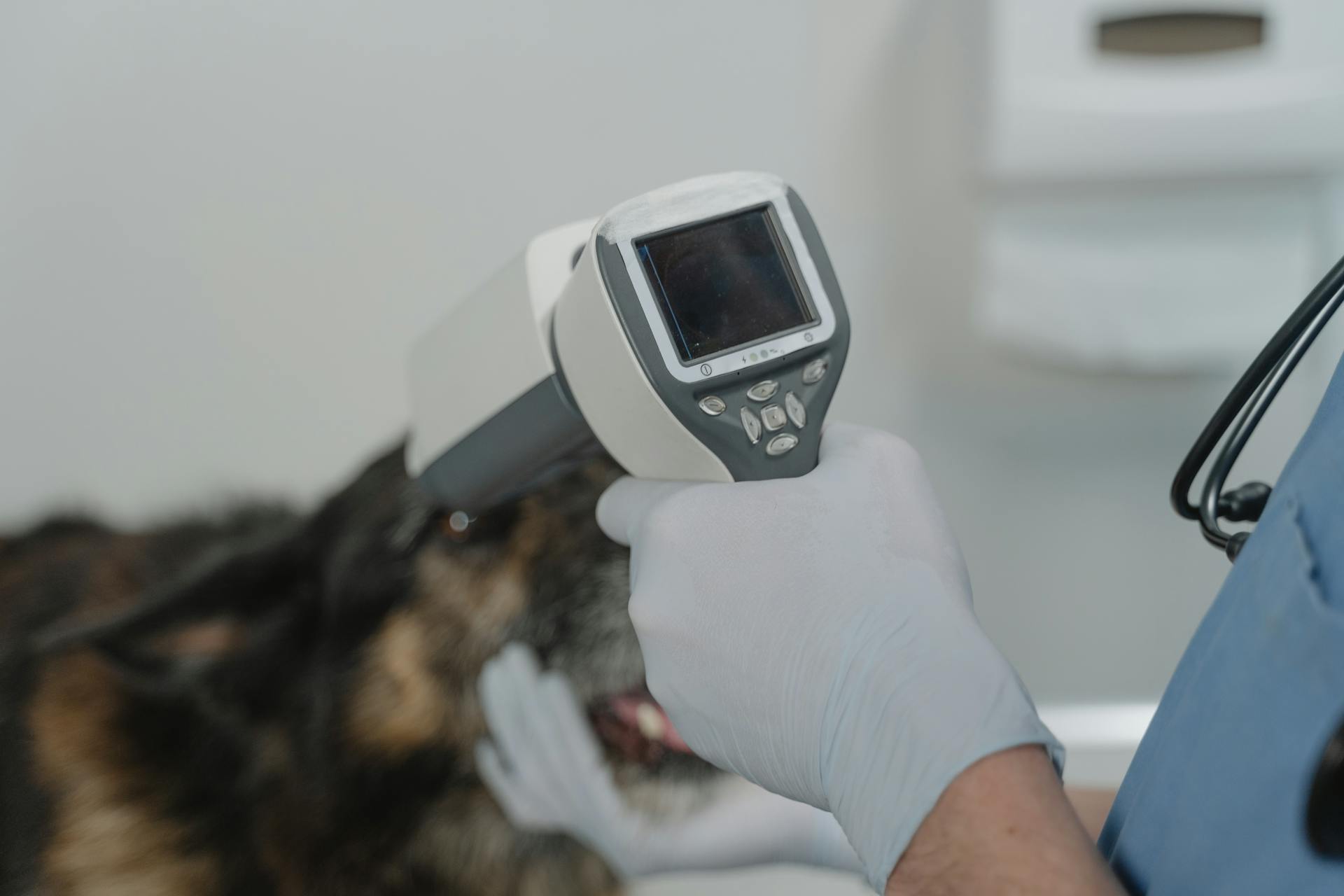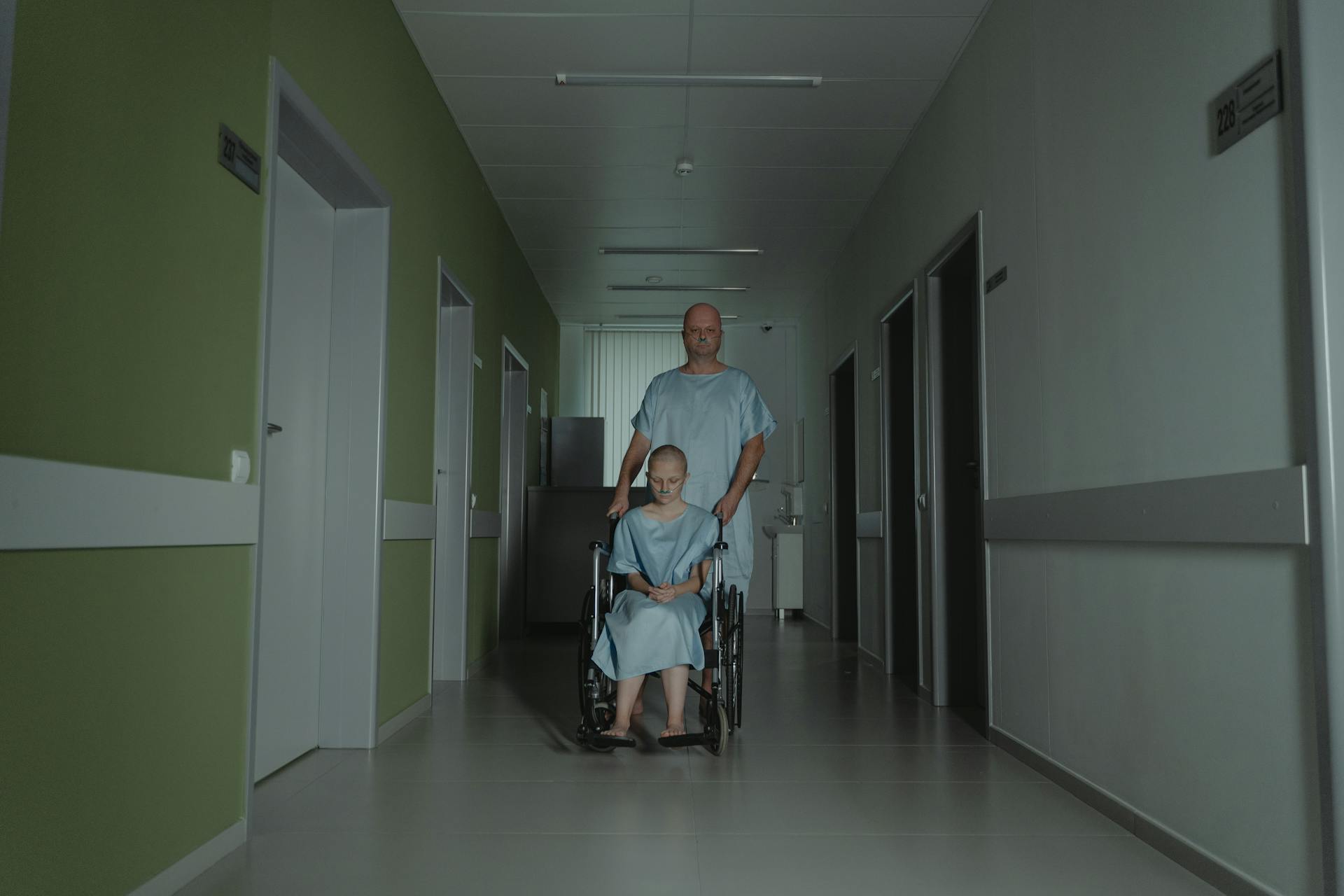
Many people are concerned about the cost of lung cancer screening, but fortunately, insurance often covers it. Most insurance plans, including Medicare, cover low-dose computed tomography (LDCT) scans, which are the standard screening method for lung cancer.
The cost of the scan can vary depending on your location and insurance provider, but it's usually covered in full or with a small copayment. For example, Medicare covers the scan with no out-of-pocket cost to the patient.
If you're concerned about your lung health, talk to your doctor about getting screened. They can help determine if you're a good candidate for the scan and what to expect during the process.
Explore further: Why Doesn't Insurance Cover Coronary Calcium Scan
What You Need to Know
Lung cancer is a serious disease that affects many people in the United States. It's the leading cause of cancer-related deaths in the country.
Over half of those diagnosed with lung cancer unfortunately don't make it past one year. This is a harsh reality that highlights the importance of early detection.
Low-dose CT scans have been shown to provide earlier detection of lung cancer when it's most treatable and curable. This is a game-changer for those at high risk.
Here are some key facts about lung cancer and its detection:
- Lung cancer is the leading cause of cancer-related deaths in the United States.
- Over half of those with lung cancer die within one year of being diagnosed.
- Low-dose CT scans provide earlier detection when lung cancer is most treatable and curable.
Lung Cancer Screening
Lung cancer screening is a crucial step in detecting lung cancer early, when it's most treatable. You're considered high-risk if you have a 20 pack-year smoking history, smoke now, or have quit within the past 15 years, and are between 50 and 80 years old.
Medicare covers lung cancer screenings with low-dose computed tomography (LDCT) once per year if you meet certain eligibility criteria. If your doctor accepts assignment, you pay $0 for this service.
Early detection of lung cancer is critical, and LDCT scans can help find abnormal areas in the lungs that may be cancer before symptoms develop. Unlike chest x-rays, LDCT scans can detect lung cancer in its earliest stages.
Additional reading: Does Insurance Cover Full Body Scans
To be eligible for Medicare coverage, you must visit your primary care provider and have an order. You're considered high-risk if you meet the following criteria:
- You are between the ages of 50 and 77 (Medicare covers up to 77 years of age, but private insurance may cover up to 80 years of age)
- You have a smoking history of 20 pack years (1 pack per day for 20 years or two packs per day for 10 years)
- You are currently a smoker or have quit in the last 15 years
Low-dose CT lung cancer screening is available at all 3 hospital locations: UP Health System - Bell, Marquette, and Portage.
Insurance and Medicare
Most insurance plans and Medicare help pay for recommended lung cancer screening tests. These tests can detect lung cancer early, when it's easier to treat.
If you have Medicare, you can visit www.medicare.gov or call 1-800-MEDICARE (1-800-633-4227) for more information about coverage. TTY users should call 1 (877) 486-2048.
Medicare Part B covers lung cancer screenings with low-dose computed tomography (LDCT) once per year if you meet certain eligibility criteria. If your doctor accepts assignment, you pay $0 for this service.
You should check with your health insurance plan to determine if lung cancer screening is a covered service for you. This is especially important if you're eligible for Medicare, which covers the service for people age 55-77 who have smoked at least 30 pack years and are either current smokers or quit within the last 15 years.
Expand your knowledge: Does Bcbs C Pay for Therapy
Qualifications and Eligibility
To be eligible for lung cancer screening, you'll need to meet certain qualifications. You must be between the ages of 55 and 77, as Medicare coverage is limited to this age range.
You'll also need to have a tobacco smoking history of at least 30 pack years, which is equivalent to smoking an average of one pack of cigarettes per day for 30 years.
Additionally, you must not have any signs or symptoms of lung cancer. If you're a current smoker or have quit smoking within the last 15 years, you'll also be eligible for screening.
To confirm your eligibility, you'll need to schedule a lung cancer screening counseling and shared decision-making visit with your doctor. This is a required step before your first lung cancer screening, and it will help you understand the benefits and risks of screening.
Here are the key qualifications for lung cancer screening:
Symptoms and Prevention
Symptoms of lung cancer can be subtle and may not be immediately recognizable. Coughing that gets worse or doesn't go away is a common symptom, but it's essential to note that different people experience different symptoms.
Chest pain and shortness of breath are also possible symptoms, and wheezing can be a sign that something is amiss. Coughing up blood is a particularly alarming symptom that requires immediate medical attention.
Feeling very tired all the time and unexplained weight loss are other symptoms to watch out for. If you're experiencing any of these symptoms, it's crucial to talk to your doctor right away.
Here's a list of common symptoms to look out for:
- Coughing that gets worse or doesn't go away
- Chest pain
- Shortness of breath
- Wheezing
- Coughing up blood
- Feeling very tired all the time
- Weight loss with no known cause
Who Can Benefit
If you're wondering who can benefit from lung cancer screening, the answer is pretty straightforward. You're eligible if you're between 50 and 80 years old and have a 20 pack-year or more smoking history.
You can calculate your pack-year history by considering how many packs of cigarettes you smoked per day for how many years. For example, if you smoked one pack a day for 20 years or two packs a day for 10 years, you'd meet this criteria. Additionally, you should currently smoke or have quit within the past 15 years.
Here's a quick rundown of the eligibility criteria:
- Age: 50-80 years old
- Smoking history: 20 pack-years or more
- Current smoking status: Currently smoke or quit within the past 15 years
Medicare Part B covers lung cancer screenings with low-dose computed tomography (LDCT) once per year if you meet these eligibility criteria.
Benefits of Screening
Early detection is key to successful treatment and survival. If lung cancer is found at an early stage, when it's small and hasn't yet spread, treatment is more likely to be successful.
Smoking is the number one risk factor for lung cancer, linked to about 80-90% of lung cancer deaths. People who smoke are 15-30 times more likely to get lung cancer than those who do not.
Quitting smoking is one of the best decisions you can make for your health. Quitting before the age of 40 can reduce your chances of dying prematurely from smoking-related disease by 90%.
Lung cancer screenings, such as LDCT scans, can help find abnormal areas in the lungs that may be cancer before symptoms develop. This is especially important because symptoms of lung cancer often don't appear until the disease is already at an advanced stage.
If you're eligible, lung cancer screenings, covered by Medicare, are a great option. They can help detect lung cancer early, when it's easier to treat.
You might enjoy: When Will Insurance Cover Mounjaro
Here are some benefits of screening:
- Increased chances of successful treatment and survival
- Early detection of lung cancer, even before symptoms appear
- Reduced risk of cancer spreading and becoming more difficult to treat
Monitoring your health closely, especially if you smoke or have a history of smoking, is crucial to detecting any health concerns early.
Who Can Benefit?
You're likely wondering who can benefit from lung cancer screening. If you're a smoker or have a history of smoking, you're at higher risk for developing lung cancer. The US Preventive Services Task Force recommends annual low-radiation CT scans for adults aged 50-80 who have smoked an average of a pack a day for 20 years.
This means if you've smoked one pack of cigarettes per day for 20 years, or two packs per day for 10 years, you're considered high-risk. Similarly, if you're currently a smoker or have quit smoking within the last 15 years, you should talk to your doctor about screening.
To give you a better idea, here are the specific criteria for who can benefit from lung cancer screening:
These guidelines are in place to ensure that you receive the benefits of early detection while minimizing the risks associated with screening. So, if you meet these criteria, be sure to talk to your doctor about scheduling an annual low-radiation CT scan.
Frequently Asked Questions
How much is a lung cancer screening?
The cost of a lung cancer screening can range from $100 to $400 out-of-pocket for those without insurance. Check if your insurance covers lung cancer screening to determine your specific costs.
Is cancer screening covered by insurance?
Yes, cancer screenings are typically covered by insurance as preventive care services, with no out-of-pocket costs for in-network care. Check your plan to see which screenings are included.
Sources
- https://www.cdc.gov/lung-cancer/screening/index.html
- https://www.uphealthsystem.com/cancer-care/lung-cancer-screening
- https://clearmatchmedicare.com/blog/medicare/does-medicare-cover-lung-cancer-screening
- https://www.bluecrossnc.com/members/preventive-care
- https://www.uofmhealth.org/conditions-treatments/pulmonary/lung-cancer-screening-clinic
Featured Images: pexels.com


